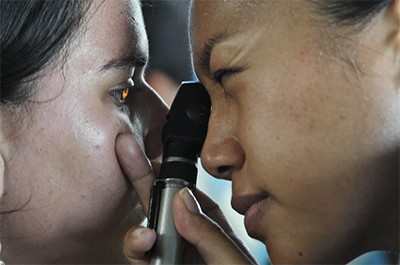Get To Know Your Doctor
Take an active role
| Download this episode | It’s important to take an active role in your health care in order to get the best care possible from your doctor or health provider. One way to do this is to improve your relationship with your provider. The first step is telling your doctor about any current and past health care issues or concerns. It’s important to share any information you can, even if you’re embarrassed. Be sure to share any symptoms you are having or have had along with personal information, including whether you are stressed or if your life is changing. You will also need to provide them with a list of any medications you are taking, including when and how often you take them. | When it comes to your health, what you don’t know can be dangerous and even deadly. It’s important not to be afraid to ask any questions you might have when discussing your health care with your physician. Don’t be afraid to speak up. The best thing you can do is let your doctor know if you don’t understand something. If you don’t ask questions, your doctor will think you understand everything he or she has told you. Be sure to ask for an explanation of something that you don’t understand. If you have questions before the appointment, just write them down and ask them during the exam. Be sure to write down the most important questions first to make sure they get answered. And don’t be hesitant to tell your doctor when you need more time to talk about something. If the doctor isn’t available to help, you should be able to talk to a physician assistant or a nurse. If no one else is available, see if you can schedule another appointment to continue your talk. | Your doctor is a good source of accurate information you can trust, so don’t hesitate to take notes during an office visit in order to help you remember any information or instructions you might have received. Sometimes it helps to bring a friend or family member with you who can help write down the answers to your questions. Some patients may need taped instructions, so feel free to ask your doctor if it’s okay to bring a tape recorder to the appointment. Many doctor’s offices have a variety of brochures or other educational materials. If there aren’t any available, be sure to ask where you can find some. Make sure to follow any instructions your doctor gave you during the appointment, like taking medicine, scheduling a test or scheduling an appointment with a specialist. If you’re confused or if you’ve forgotten some information, it’s OK to contact your doctor, particularly if you start to feel worse or have problems with your medicine or you are awaiting test results. | One of the best ways to communicate with your doctor and health care team is by asking questions. Because time is limited during medical appointments, you will feel less rushed if you prepare your questions before your appointment. Some questions may seem simple enough, even trivial, but they can be very helpful when it comes to determining the best way to treat a medical problem. For example, if a drug has a complicated name, be sure to ask your physician or health-care provider how to properly spell its name. You should also ask if there are any side effects associated with the drug and if it will interact with any medications you are already taking. When a test is ordered by your physician, it can’t hurt to ask what the test is for exactly, why you need it and when you will get the results. When it comes to methods of treating a disorder, ask your doctor if there are any alternatives to the treatment prescribed for you and if there are any possible complications. | All parents want what’s best for their child, particularly when it comes to their health. But finding time for regular check-ups and sick visits can be difficult due to busy schedules. When seeing a doctor, it’s important to remember that they are usually busy as well, so make the most of your time together. A common problem that may hinder a relationship with your child’s doctor is unrealistic expectations or an unwillingness to trust a doctor’s treatment of a minor illness. For example, many parents expect a drug or medicine for common colds, when a wait-and-see approach may be better. As a result, some doctors may feel pressured to give in to parental expectations for prescriptions or treatment, even when it’s not necessary or in the best interest of the child. It’s good to ask questions, but let the doctor know that you want diagnoses and prescriptions to be based on the best decision for the health of your child, not what’s easier for you or makes you feel better.
Transcript
Don’t be afraid to ask questions
Transcript
A good source of information
Transcript
Be prepared
Transcript
What’s best for your child
Transcript
